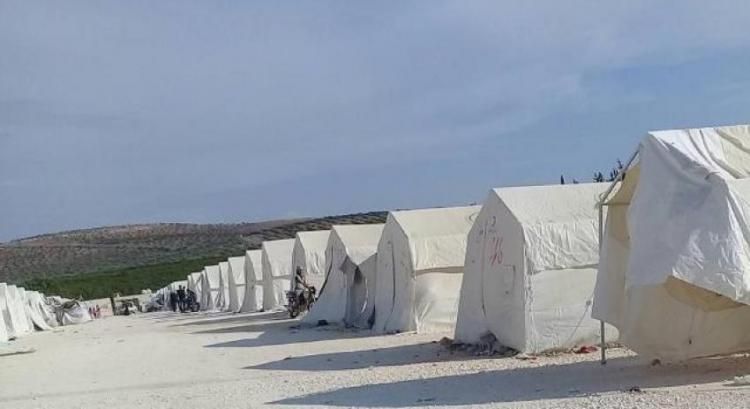North Syria – North-press Agency
Poor humanitarian conditions and the shortage of relief support are forcing camp residents in northern Syria to sell the last of their furniture, which they carried with them while they were moving from place to another.
Hussein Mustafa Amouri, director of the al-Kassar Harbnoush camp north of Idlib, told North-Press, "The economic situation of the people in the camp is very difficult in the absence of any job opportunities, while the monthly expenses of one family of six persons reach 100,000 SYP."
He added that "displaced people suffer from the difficulty of securing the expenses of daily life, and many of them are forced to sell the remaining furniture from their houses, electrical devices, or other things they have in order to secure living expenses."
The camp houses 55 displaced families from the southern countryside of Aleppo residing in 53 tents, who arrived at the camp early this year, lacking the most basic elements of human life, according to Amouri .
Random distribution
Amouri said, "regarding to the supporting relief organizations, there is no organization that supports the camp monthly, but the distribution process is done randomly. There is al-Bnaa organization, which provides us with water, hygiene, and bathroom blocks, and also the organization Nasa’m al-Kheir, which distributed a relief basket to each family last month. It was expelled from the area by the local council last month without reason.
In response to a question about the last time food aid was received, Amouri replied that "about a month and a half ago, one small food basket, worth about $10 each, was distributed by a humanitarian."
Sanitary situation
The suffering of the camp's residents is not limited to poor living conditions, but also extends to the health aspect, which is equally bad.
Amouri said that "the health situation is deteriorating; there are about five disabled children in the camp, four individuals over the age of 80, and also cases of patients with chronic diseases such as pressure, diabetes, and heart disease.
Similar situation
In Deir Ballut and Muhammadiyah camps in the countryside of Afrin, north of Aleppo, the humanitarian situation for the displaced was not better than other the camps.
One of the first IDPs living in Yarmouk camp, Rami al-Sayyid, told North-Press that the two camps house about 1,300 families, most of them are displaced from south of the capital, Damascus, such as Yarmouk camp, al-Sayyeda Zainab, al-Hajar al-Aswad and some areas of al-Tadamon, al-qadam , al-Assali, Wilda, and Babila.
He added that the displaced people need all the necessities of daily life, but the most important needs in this period are drinking water and water for home use, especially with the rise in temperatures. There is an urgent need for water, which is scarce and not nearly enough for all camp residents. People are in need of humanitarian aid, and no aid was distributed during the month of Ramadan in the camp, and the last one was several days before Ramadan.
Al-Sayed pointed out that the Turkish Avad is responsible for ensuring the needs of the displaced.
In general what these organizations provide is very weak and does not cover the daily needs for the displaced.
Poverty line
He added that "one of the main problems that the IDPs suffer from is unemployment, and the majority of them live below the poverty line and on scarce humanitarian aid, in addition to problems with transportation and transportation fees since the camps are very far from city centers.
With regard to the monthly family expense, workers' wages are still below the required level in a bitter economic reality. A family's expense cannot be determined because all families deal in the Syrian pound, which collapses every day, and some people live on remittances that they receive from abroad from friends and relatives.
He continued, "The cheapest dish per day costs about five dollars per family, which is an average dish, and most people are unable to provide basic materials in the light of the exorbitant prices. People depend on their livelihood for debt and for one meal for a long time."
There are about 200 illnesses in the camp, according to al-Sayed, which vary between chronic disease patients, war injuries, disabilities, and the elderly.
The camp residents also suffer from respiratory diseases such as asthma and allergies due to the conditions of tents and moisture, as they are located near the Deir Ballut river. This is in addition to the spread of insects and the absence of distribution of hygiene baskets that were distributed only 5 months ago in the camps, in addition to water scarcity.
The Syrian Response Coordinators team estimated the numbers of the northern Syrian camps at 1,277, including 366 random camps in which 1,041,943 displaced persons reside, indicating that there are 18,772 cases of people with special needs, and 9,867 women without breadwinners.

